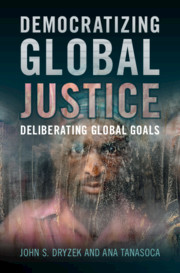Book contents
- Democratizing Global Justice
- Democratizing Global Justice
- Copyright page
- Contents
- Preface
- List of Abbreviations
- 1 Introduction
- 2 Agents of Justice
- 3 Democratizing Formal Authority
- 4 Democratizing Money
- 5 Democratizing the Power of Words
- 6 Empowering the Many
- 7 Democratizing Intergenerational, Interspecies, and Ecological Justice
- 8 Global Justice in the Deliberative System
- 9 Conclusion
- References
- Index
5 - Democratizing the Power of Words
Experts, Public Intellectuals, Advocacy Groups, and the Media
Published online by Cambridge University Press: 21 May 2021
- Democratizing Global Justice
- Democratizing Global Justice
- Copyright page
- Contents
- Preface
- List of Abbreviations
- 1 Introduction
- 2 Agents of Justice
- 3 Democratizing Formal Authority
- 4 Democratizing Money
- 5 Democratizing the Power of Words
- 6 Empowering the Many
- 7 Democratizing Intergenerational, Interspecies, and Ecological Justice
- 8 Global Justice in the Deliberative System
- 9 Conclusion
- References
- Index
Summary
Global governance is transacted through the medium of language. This chapter scrutinizes the standing of agents of justice who rely on words: experts, public intellectuals, advocacy groups, and the media, all of which have played major roles in both the Sustainable Development Goals and climate governance. Democracy and expertise exist in tension. There are problem-solving benefits in the integration of lay and expert perspectives that deliberative democratization would enable. The partial perspectives that public intellectuals offer ought to be reconciled in deliberation involving a broad public whose situated knowledges may increase the quality of outcomes. Non-governmental organizations, advocacy groups, and activists have important roles, but when they implicitly claim to represent categories of people they become democratically problematic – potentially distorting the content of global justice. Advocacy groups (such as Oxfam) have special duties toward the poor they claim to represent, which should embed their representation in deliberative democracy. The role of old and new media alike has been troublesome on matters of global justice, for example in contributing to polarization and organized climate change denial. In the context of the expressive overload that now pervades social media, it is necessary to cultivate deliberative spaces of reflection.
Keywords
- Type
- Chapter
- Information
- Democratizing Global JusticeDeliberating Global Goals, pp. 102 - 132Publisher: Cambridge University PressPrint publication year: 2021

